In manga and anime, sometimes a character is pierced by arrows symbolizing something harsh that's being said about them, or told them directly. Typically, the arrows go through their chest, and it's just a visual representation of a figure of speech, so nobody dies from being pierced by these, although they may cough blood or bleed or appear to have died temporarily for the sake of comedy..
Right: Yashiro Nene 八尋寧々
Anime: Jibaku Shounen Hanako-kun 地縛少年花子くん (Episode 7)
- Context: Nene tells Hanako something that pierces through his very core.
- sore de omotta no, Hanako-kun tte shoujiki chotto mendou-kusai na tte
それで思ったの 花子くんって正直ちょっと面倒くさいなって
[So I thought]... Hanako-kun, honestly [you] are a bit of a pain in the ass, [aren't you].
- mendou-kusai - literally "smells of trouble," in the sense it feels like it takes (too much) effort to handle.
Symbol
The words arrows likely come from one of the two following expressions: first, there is:
- zuboshi
図星
Bullseye. The center of a target, e.g. in an archery competition. Although it seems that in modern times it's not actually used to refer to the center of a target in archery, instead the correct term would be something like hoshimato 星的.- hoshi 星 means "star," ~boshi is rendaku 連濁.
What the word above is actually used for is when, for example, someone correctly guesses the reason behind someone else's behavior, and it's so "on the mark" that they can't really respond, so it's zuboshi.
- You like him don't you?
- ...///
- I knew it! (zuboshi!)
The second expression would be this:
- {kokoro ni sasaru} kotoba
心に刺さる言葉
Words [that] {pierce the heart}.- In the sense of words that struck you somehow, perhaps even words that you agree with, though the symbol seems to be used only with harsh words.
- sasaru - for something "to pierce" something else, forms an ergative verb pair with sasu 刺す, "to pierce [something] with [something else]." From there, the verb sasaru alone is also used when you're struck by words emotionally.
- mune ni sasaru
胸に刺さる
[For something] to pierce [one's] chest.
Examples
For reference, some examples:
Word in Arrow Symbol
Sometimes, the arrow that pierces the character will literally contain a label with the harsh word that struck them.
Right: Suzuki Iruma 鈴木入間
Anime: Mairimashita! Iruma-kun 魔入りました!入間くん (Season 2) (Episode 9)
- Context: Clara, thought to be the most stupid character in the series, scores higher in the school exams than Iruma, telling him:
- yuu aa watashi yori aho
ユーアー私よりアホ
You're more stupid than me.
- yuu aa - katakanization of "you are."
Pierced by Speech Balloon
In manga, the piercing words may be an entire text balloon.
- Context: Mutsumi 睦美 says why she's frustrated.
- datte... minna ijimeru shi, mushi suru shi'...
だって・・・みんなイジメるし無視するしっ・・・
Because... everybody bullies [me], ignores [me]... - Mutsumi φ, nanimo {warui} koto shitenai noni!
睦美 なにも悪いことしてないのに!
Even though Mutsumi did nothing wrong! - ichininshou ga namae tte no ga shara-kusee
一人称が名前ってのがしゃらくせぇ
[Using] [your] name as first person pronoun feels cheeky.- shara-kusee - contraction of shara-kusai 洒落臭い, literally "reeking of impertinence," as in it seems like it's cheeky, impudent, from how it looks.
- Yato-san kuuki wo!!
夜トさん空気を!!
Yato-san, read the [air]!!
- kuuki yome
空気読め
Read the air. (literally.)
Read the room. Pay attention to social cues. (used here because the girl was crying frustrated and he just threw a sharp jab on her behavior.)
- kuuki yome
Arrows Without Words
Not every word arrow comes with words, sometimes the words come separately, that is, while someone says something to or about the character, they're struck by arrows coming from who knows where, but they aren't labelled anyhow.
Anime: Tatoeba Last Dungeon Mae no Mura no Shounen ga Joban no Machi de Kurasu You na Monogatari, たとえばラストダンジョン前の村の少年が序盤の街で暮らすような物語 (Episode 11)
- Context: Alan talks about how there are many completely random rumors being spread around town about him, followed by this cut(see: anime terminology) in which examples are listed: his back is turned to the camera and the voice of townspeople can be heard as if they were talking behind his back. Three quick, different rumors are played, and with each rumor he gets pierced by a different symbolic arrow.
- Context: the demon lord kidnapped a princess, but she causes a lot of trouble in the demon castle. During a conference, he's told he shouldn't mind it because of all she's going through, and as his cruel deeds are listed, the words hurt him.
- {saratta} honnin
さらった本人
The person himself [who] {kidnapped [the princess]}. - ano ko wa {nete-iru} aida ni saraware
あの子は寝ている間にさらわれ
That girl was kidnapped while {[she] was sleeping}, and...- was sleeping - see Tense in subordinate clauses.
- saraware - "kidnapped, and..." - ren'youkei 連用形 of sarawareru さらわれる, "to be kidnapped," passive form of sarau さらう, "to kidnap."
- He gets struck by one arrow as he's told this.
- ikinari kazoku to mo hiki-hanasareta
いきなり家族とも引き離された
...suddenly separated from her family, too.- Second arrow.
- soshite kono shiro de hitori-bocchi
そしてこの城で一人ぼっち
And in this castle [she] is all alone.- Third arrow.
Actual Arrows
Sometimes the arrows are shaped like real arrows, as opposed to the more abstract geometric figure of an arrow.
- Context: Todomatsu トド松 murders his brothers with words, symbolized by arrows. They wanted to enter the coffee store (Starbucks) where he worked, and he begged them to leave, saying he was embarrassed by their existence, and comparing the Starbucks clientele and them to angels and poop, respectively.
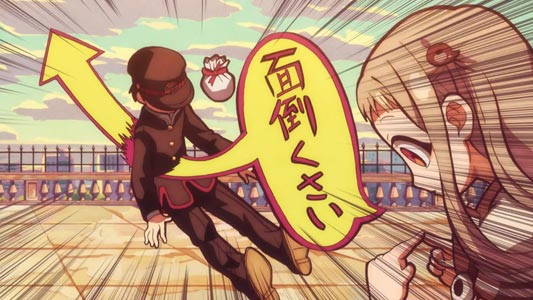
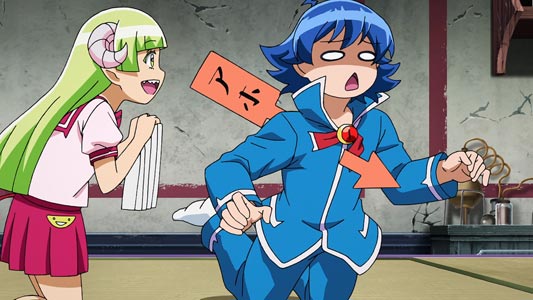
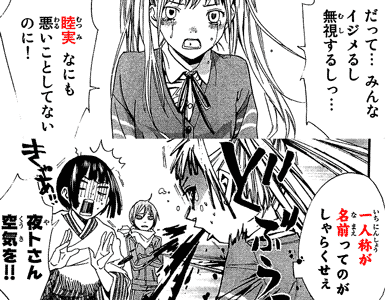
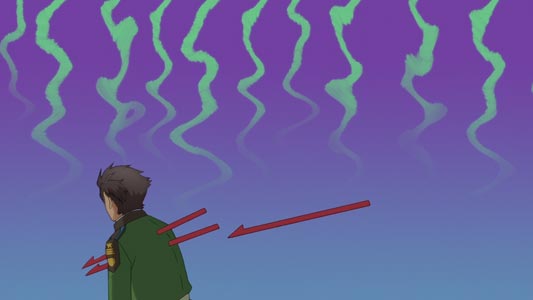
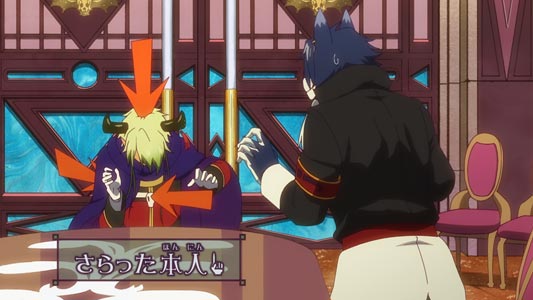
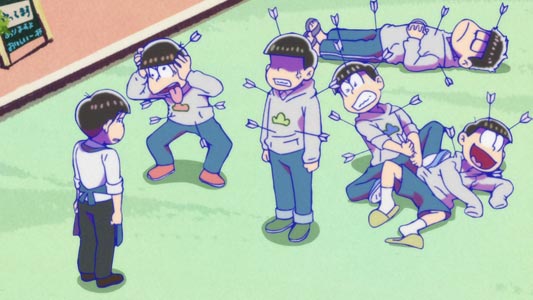
No comments: